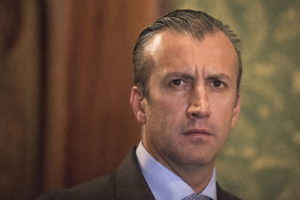US Sanctions Venezuelan Vice President for Drug Trafficking
The Trump administration imposed sanctions on Venezuelan Vice President Tareck El Aissami on February 13 after accusing him of involvement in the international narcotics trade. According to a Treasury Department statement, El Aissami “facilitated shipments of narcotics from Venezuela, to include control over planes that leave from a Venezuelan air base, as well as control of drug routes through the ports,” reportedly in connection to the Las Zetas cartel in Mexico.

El Aissami, appointed vice president on January 4, allegedly protected a Colombian drug lord and oversaw the shipments of over 1,000 kilograms of narcotics on multiple occasions.
The move prohibits U.S. citizens, institutions, and companies from doing business with the Venezuelan national and freezes his assets in the United States, which officials total in the tens of millions of dollars.
In a statement on his official Twitter account, El Aissami condemned the accusations and vowed to display “greater strength” in the face of what he called “imperialist aggression.” “May we not be distracted by these miserable provocations,” he added. “Our principal job is to work with [President] Nicolás Maduro in the economic recovery.”
The sanctions come amid an economic collapse punctuated by widespread food and medicine shortages, soaring prices and crime, and increased government action against all forms of dissent.
Venezuela’s Foreign Ministry denounced the move as an “unprecedented act” in U.S.-Venezuelan relations, accusing the Trump administration of violating international law. Tensions between the two countries have risen in recent years, with neither country exchanging ambassadors since 2010.
“[The sanctions] can be seen as the opening salvo of the Trump administration in dealing with Latin America’s deepest crisis,” said Michael Shifter, president of the Inter-American Dialogue, a think-tank based in Washington, D.C.
Shifter concluded, “It is hard to imagine that, with this decision, Washington will now be inclined to offer many carrots to the increasingly authoritarian regime.”
